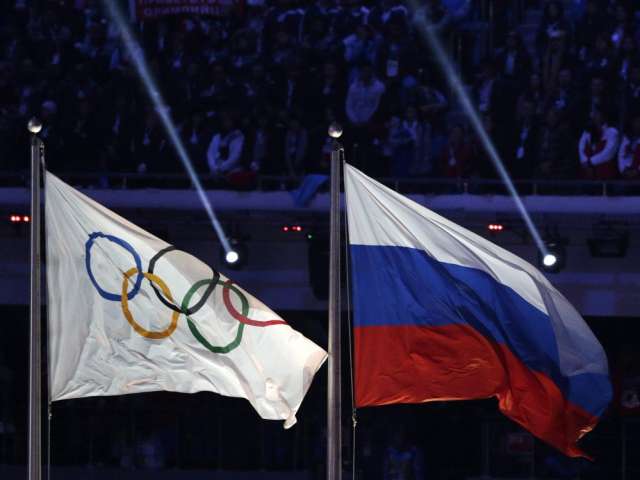WADA is set to strike one more blow against Russian doping — but will the IOC ever do the same?

Over the whole of the investigations into Russia’s doping scheme that are now approaching three years in length, there have been certain consistent responses from the major players.
The World Anti-Doping Agency has responded to the various revelations — a government-controlled program in which top Russian anti-doping officials were in fact very much pro-doping — with sound and fury. WADA has declared Russian facilities non-compliant with international standards, it has called for blanket bans on Russian athletes, it has demanded that Russia apologize for what it has done. WADA wants to drop hammers, throw books, lower booms, and whatever other cliché you want to employ.
The Russians have waved it all off as the false accusations of a known liar in service of a Western plot.
And the International Olympic Committee has considered both of these positions and adopted the brave stance of trying to avoid coming too close to either of them. Thirty-five months on, the IOC has performed a master class in dithering.
But now, maybe, just maybe, could the IOC be rustling up the nerve to do something dramatic? If it’s not quite ready to drop the hammer, is it at least giving the hammer the side-eye?
In this Feb. 23, 2014 file photo, the Russian national flag, right, flies after it is hoisted next to the Olympic flag during the closing ceremony of the Winter Olympics in Sochi.
WADA is expected to announce this week that the Russia Anti-Doping Agency remains non-compliant, which is not particularly surprising, since Russia has continually refused to do what WADA asked, including handing over thousands of stored urine samples that could further confirm the many allegations outlined in WADA-commissioned investigative reports. (Notably, those samples could also exonerate Russia if, as it has alleged, the WADA charges are all made-up bunkum.)
The question of compliance comes after WADA announced last week that it had obtained electronic files from the Moscow lab whose former director, Grigory Rodchenkov, was the key source in media reports into Russian doping and who co-operated with the WADA probes headed by Canadian lawyer Richard McLaren. It is unclear what that electronic data would mean in terms of the evidence already released; Rodchenkov himself provided hundreds of spreadsheets and emails that purported to show how Russia gamed the system.
But if WADA now has files directly from the lab’s database that match what is already out there, it would in theory have proof that the whistleblower’s own documents are legitimate. Would that be enough to finally tip the IOC toward strong action?
The IOC has throughout this story wanted a black-and-white result when it was always bound to involve a lot of grey. From the moment a German television documentary aired wild allegations of a state-wide doping program working out of the Moscow lab, Russia has refused to co-operate with subsequent investigations. It stashed athletes at guarded military facilities to foil drug testers and it kept urine samples away from further scrutiny. Its two-pronged response — to insist on its innocence while refusing all attempts at transparency — has ensured that the IOC will never be given the kind of evidence that normally forms anti-doping cases.
But it was always going to have to make a judgment call at some point. Aside from whatever it acquired last week, WADA’s evidence included this: testimony and documents from Russia’s former top anti-doping scientist, who fled to the United States in fear of his life and remains in hiding. It has evidence of urine-collection bottles that were tampered with, and in the limited re-testing that it was able to carry out, it found the samples themselves had been manipulated.
 Dr. Grigory Rodchenkov.
Dr. Grigory Rodchenkov.
Both were elements of the frankly unimaginable system that Rodchenkov had described: dirty urine samples swapped for clean in the dark of night by Russian security operatives through a secret hole in the wall of the Sochi drug lab. Meanwhile, the whole system of drug testing was said to be compromised, with promising Russian athletes put on a “protected” list and whose positive drug-test results would simply be switched to negative. In that scenario, what good is any negative test?
This was just not an ordinary drug scandal, and short of the Russians suddenly copping to it, the IOC was going to have to make some extraordinary decisions. In the run-up to Rio 2016, it punted, leaving individual athletic federations to decide on sanctions. (Most let Russians compete.) After McLaren’s second report was issued post-Rio, the IOC set about conducting its own months-long probes, unwilling to take WADA at its word. And according to the New York Times last week, Olympic officials are considering measures other than a ban that might include forcing Russian athletes to compete under a neutral flag, or banning the Russian anthem from medal ceremonies.
In the latter case, you could have a Russian medallist from Sochi — the absolute peak of the doping scheme — who wins a gold medal again in Pyeongchang, and who still takes the top of the podium ceremony, to what one guesses would be a few minutes of weird silence. At that point, it would be interesting to ask the silver and bronze medallists if they think the Russian has been properly sanctioned. (Let alone whoever comes in fourth.)
WADA, along with 17 national anti-doping agencies that published a letter in September demanding the IOC ban Russia from Pyeongchang, surely hopes the latest evidence trove will convince Olympic officials to heed its calls.
We shall see. For all of the fancy science that goes on in WADA’s labs, it hasn’t figured out a way to make the IOC grow a spine.
• Email: sstinson@postmedia.com | Twitter: @scott_stinson





